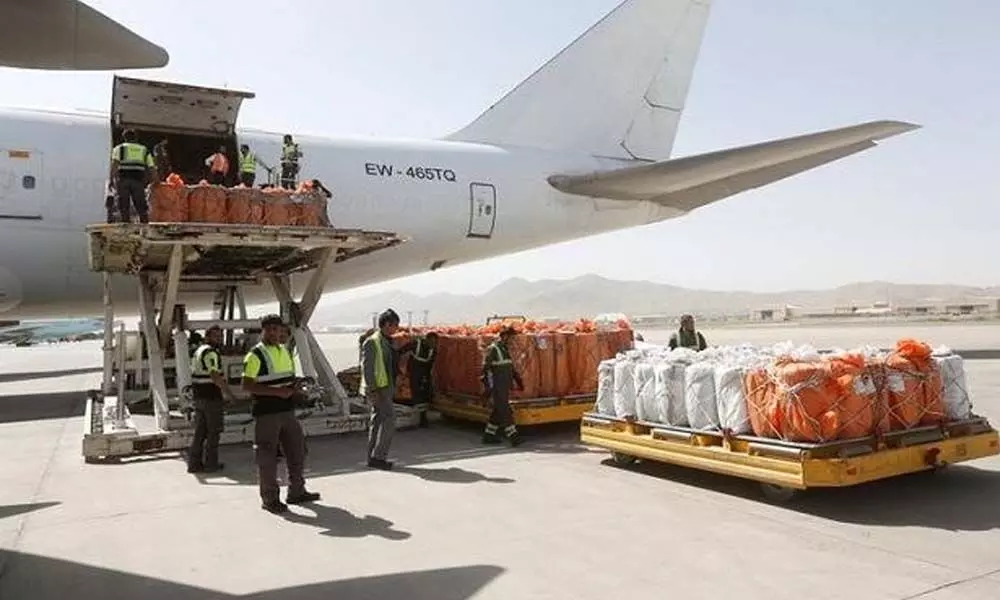Rosy outlook for air cargo industry as world battles with Covid-19
The global air cargo industry ended 2020 with $128.2 billion in revenues, a new all-time high, amid a surge on rates resulting from limited cargo capacity
image for illustrative purpose

The pandemic has shattered so many lives and economies. And its longer-term effects for people and businesses, for better or worse, are irrevocable, leaving us with no option but to adopt to our new normal and the evolving challenges.
When the Coronavirus spread worldwide, the global air cargo industry became the lifeline of humanity, transporting vital medical supplies and other essentials to save lives while the many people behind their operations are risking their own. Its role continued this year with the additional responsibility of flying billions of Covid-19 vaccines across continents which the International Air Transport Authority (IATA) dubbed as the 'mission of the century.' So far, more than 4.54 billion doses have been administered globally with about 30.4 per cent of the world population receiving at least one dose of Covid-19 vaccine, according to various reports. By the end of this year, more than 11 billion doses would have been manufactured.
Covax or the Covid-19 vaccines global access, a worldwide initiative aimed at providing for an equitable access to Covid-19 vaccines directed by GAVI, the Vaccine Alliance, the Coalition for Epidemic Preparedness Innovations, and the World Health Organization, has delivered more than 188 million doses to 138 countries to date.
By early 2022, Covax hopes to distribute 2 billion doses to poor income nations, funded by G7 countries and other donors. Their efforts, however, remain heavily challenged due to financial constraints, poor health infrastructure and systems as well as the emergence of new Covid variants disrupting global recovery.
The global air cargo industry ended 2020 with $128.2 billion in revenues, a new all-time high, amid a surge on rates resulting from limited cargo capacity, even as there remains, on the other hand, a high demand for air cargo goods and e-commerce shipments.
"As a result, air freight rates were 55.9 per cent higher in 2020 overall compared to 2019, at 2.79$/kg. Combined with the relatively resilient outcome in air cargo volumes (down 9.1 per cent year-on-year in 2020), this means revenues from transporting goods by air rose by 27.2 per cent in 2020. At $128.2bn, this is a new all-time high. This far offsets the fall in passenger traffic, but still provides needed support to airlines that were able to operate cargo flights," IATA pointed out in its newly-released World Air Transport Statistics 2021 (WATS). Many airlines whose passenger planes remain grounded due to the pandemic and travel ban opted to convert some aircraft to freighter use yet their combined capacity were still not enough to meet the surge on air cargo demand. "The lack of available passenger aircraft meant that air cargo capacity was not sufficient to accommodate the rapid rebound in demand. Indeed, despite airlines increasing freighters capacity and converting passenger aircraft to freighters, industry-wide available cargo ton-kilometers (ACTKs) fell 21.2 per cent year-on-year in 2020. This led to a capacity crunch, with the industry-wide cargo load factor up 7.1 percentage points to 53.9 per cent. This is the highest value in the IATA series started in 1990," WATS said.
By end-2020, industry-wide cargo ton-kilometers (CTKs) had returned close to pre-crisis values, IATA said. But noted that the yearly decline in cargo demand (CTKs) was still the largest since the Global Financial Crisis in 2009, at a sizeable 9.7 per cent year-on-year in 2020. The high demand for air cargo services is carried through 2021 with the first half of the year seeing 8 per cent growth, the industry's strongest half performance in four years. Cargo business has indeed created opportunities for many struggling airlines, some accounting for as much as 49 per cent of their revenues in 2020.

